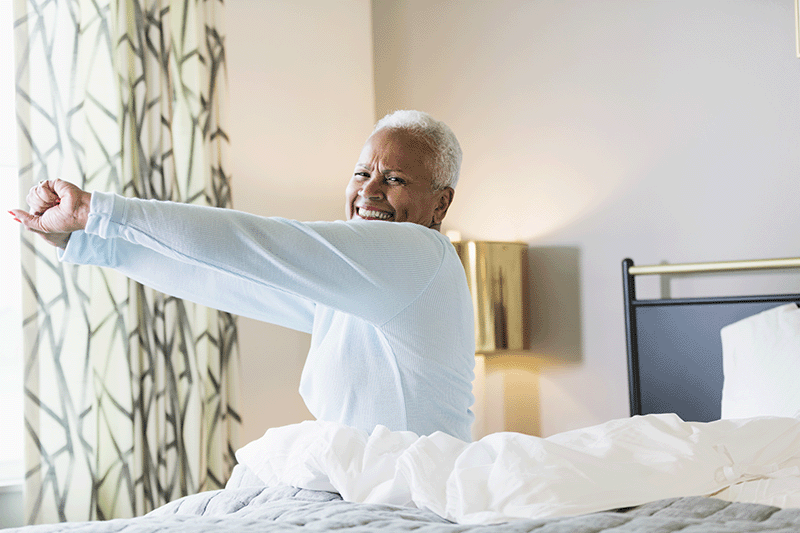How Much Sleep Do Seniors Need?
It's no secret that a good night's rest is critical to our well-being at any age. But did you know that as we get older, our sleep needs and patterns change? As part of maintaining a healthy lifestyle, it's important to understand how much sleep seniors need and how to make the most of those hours.

Recommended Hours of Sleep for Seniors
The National Sleep Foundation guidelines suggest that adults over 65 ideally need 7-8 hours of sleep per night. However, the crucial caveat is that these are guidelines, not rigid rules. Many factors influence the recommended hours of sleep for seniors, including health conditions, medication use, and overall lifestyle. If you're feeling well-rested and functioning optimally throughout the day with slightly less than 7 hours, that might be perfect for you.
Understanding Changes in Sleep Patterns
As we age, our sleep patterns become lighter. We tend to experience:
- Decreased Deep Sleep: Deep sleep is a restorative stage, vital for both physical and mental recovery. Seniors typically spend less time in this stage than younger adults. Understanding how many hours of deep sleep seniors need can help in managing sleep schedules for better health.
- Wake-Ups During the Night: It's normal for older adults to wake up more frequently through the night, with difficulty falling back asleep impacting overall sleep quality.
- Earlier Sleep and Wake Times: The body clock naturally shifts, making you feel tired earlier and waking earlier than in younger years.
Tips for Improving Your Sleep
For seniors, getting the recommended hours of quality sleep might take a little more intention as you age, but with the right approach, you can enhance your nights and reap the benefits for your overall wellness:
- Stick to a Schedule: Maintain a consistent sleep-wake cycle, even on weekends, to regulate your body's internal clock.
- Embrace the Early Bird: Adjust daily activities to align with your earlier sleepiness in the evening.
- Optimize Your Sleep Environment: Ensure your bedroom is dark, quiet, and at a comfortable temperature. Invest in a supportive mattress and comfortable bedding.
- Manage Naps Wisely: Brief afternoon naps can be refreshing, but avoid long naps or napping late in the day, as it can disrupt your nighttime sleep.
- Watch What You Eat and Drink: Avoid caffeine and alcohol before bed. A big meal right before bedtime can interfere with sleep, but going to bed hungry can also be disruptive.
- Get Moving: Regular physical activity, especially outdoors in the morning sunlight, promotes better nighttime rest.
- Reduce Stress: Practice relaxation techniques like meditation, deep breathing, or a warm bath before bed to calm the mind. Think about joining a meditation or yoga group.

When is it Time to Talk to Your Doctor?
While occasional restless nights are part of the aging process, there are some situations where you should speak with a medical professional:
- Frequent Sleep Disruptions: If you are regularly waking up multiple times and experience difficulty falling back asleep at night.
- Excessive Daytime Sleepiness: Feeling overwhelmingly tired throughout the day, even if you feel you slept an adequate number of hours.
- Loud Snoring or Breathing Pauses: These could be signs of sleep apnea, a potentially serious sleep disorder.
The Importance of Prioritizing Sleep
Getting the recommended hours of adequate sleep is crucial for the well-being of seniors. It has a direct impact on:
- Energy Levels and Alertness: Improved focus and concentration during the day.
- Mood and Emotional Health: Good sleep can alleviate irritability and anxiety.
- Cognitive Function: Sufficient rest helps keep your memory and thinking sharp.
- Immunity: Restorative sleep plays a role in strong disease resistance.
- Overall Health: Long-term, quality sleep can help minimize the risk of heart disease, high blood pressure, and other chronic conditions.
Supporting Your Sleep and Well-being at Acts Retirement-Life Communities
At Acts, we prioritize the health and wellness of our residents. Our commitment extends beyond providing a comfortable atmosphere. By understanding how much deep sleep seniors need is necessary for older adults, we recognize the importance of rest. We understand the importance of sleep and aim to create opportunities for you to optimize yours. From quiet environments to fitness and wellness programs, Acts communities offer the tools you need to prioritize your rest and reap the benefits of a brighter, more energetic lifestyle.
If you’ve been considering a move to a retirement community, where you can enjoy amenities, activities, social interactions, and even opportunities for mindfulness and mental fulfillment, explore our 28 beautiful communities across the East Coast. Each one provides independent living with on-campus health services like assisted living and memory care should the need ever arise. For answers to common questions, take a look at our independent living FAQs to better understand if this lifestyle is right for you.





